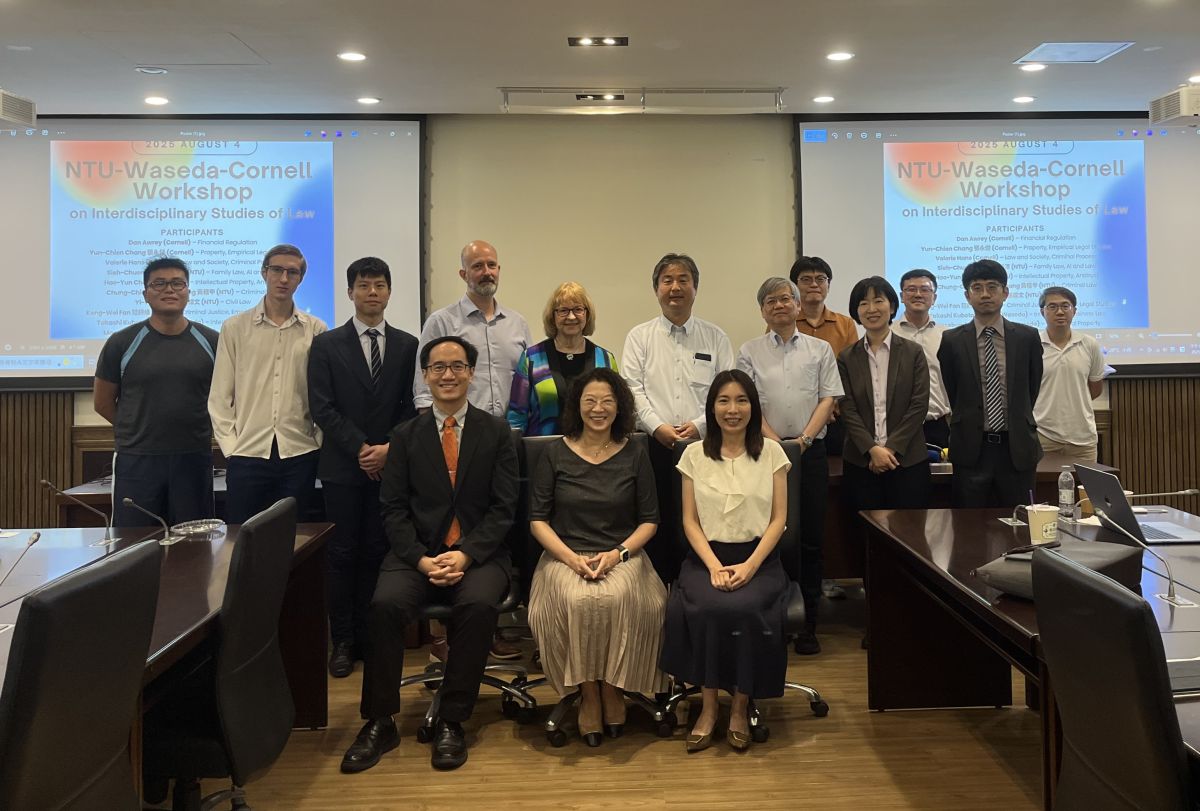On August 4, 2025, the “NTU–Waseda–Cornell Workshop on Interdisciplinary Studies of Law” was held at the First Conference Room (Room 1710), Tsai Lecture Hall, College of Law, National Taiwan University (NTU). This year marked the first time NTU, Waseda University, and Cornell University jointly organized such an academic exchange. The workshop was designed as a two-part event: the first segment took place on July 30-31 at Waseda University, featuring presentations by Cornell and Waseda faculty with commentary from NTU scholars. The second segment, hosted at NTU on August 4, reversed the roles—Cornell and NTU professors delivered presentations while Waseda faculty provided commentary. The collaboration aimed to foster cross-institutional and interdisciplinary research in law, with topics spanning AI and legal explainability, empirical studies of Taiwan’s citizen judge system, patent exhaustion in the IoT era, and corpus analysis of constitutional texts. The workshop opened at 9:10 a.m. with welcome remarks from Dean Huang-Yu Wang.
Morning Sessions
The first session began at 9:20 a.m., with Professor Sieh-Chuen Huang presenting “What Explainability Means in Law,” exploring how scientific notions of “interpretability” and “transparency” in AI can be translated into normative legal standards. Professor Valerie Hans commented on the psychological factors influencing public trust in machine decision-making, while Professor Takashi Kubota addressed broader questions about the origins of trust in judicial systems.
At 10:30 a.m., Professor Hans delivered the second keynote, offering initial observations on Taiwan’s citizen judge system since its implementation in 2023, and comparing it with jury systems in other countries. Her assessment of Taiwan’s early results was notably positive. Commentators included Professor Keng-Wei Fan, who shared preliminary findings from experimental research commissioned by Taiwan’s Judicial Yuan, and Professor Chung-Chia Huang, who urged caution in interpreting high satisfaction survey results and noted the potential bias introduced by judicial discretion in selecting cases for citizen judge trials.
The third morning session, starting at 11:40 a.m., featured Professor Hao-Yun Chen discussing new challenges to patent exhaustion in the IoT era, comparing the approaches of Taiwan, Japan, and the United States. The discussion with Professor Masabumi Suzuki and Professor Yun-Chien Chang delved into the rationale for extending patent rights to downstream uses of patented goods, drawing parallels with covenants in common law property systems. The morning program concluded at 12:40 p.m., with coffee, tea, fruit, and lunch provided for participants.
Afternoon Sessions
The afternoon program opened at 2:00 p.m. with Professor Dan Awrey’s talk on “Payment Network Governance,” examining the trade-offs between network stability, accessibility, and investment, and their interaction with policy goals such as consumer protection, financial crime prevention, financial inclusion, and systemic stability. Professors Kubota and Professor Chen served as commentators.
At 3:10 p.m., Professor Chung-Chia Huang presented his use of natural language processing (NLP) to analyze the influence and longevity of constitutional texts. Using a dataset of over 500 constitutions and reference points from four core and twelve iconic constitutions, his findings showed the enduring global influence of the U.S. Constitution (1791) and the French Constitution (1848). Commentators Professor Awrey and Professor Huang (Sieh-Chuen) discussed methodological considerations in translation and alternative influence metrics.
The final session at 4:20 p.m. featured Professor Yun-Chien Chang applying complex systems theory to compare trust law in common law and civil law systems. He proposed conceptualizing trust as a “semi-property” to bridge functional gaps in civil law jurisdictions. Professors Suzuki and Professor Yi-Wen Chang commented on parallels with other contractual arrangements trending toward property-like status. The day’s program concluded at around 5:20 p.m.
A Platform for Future Collaboration
The workshop’s intensive schedule and in-depth exchanges fostered robust academic dialogue among faculty and students from all three universities, laying a strong foundation for sustained collaboration in interdisciplinary legal research.

